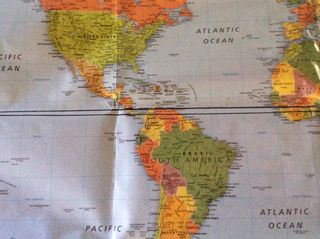So we said goodbye to happiness
And here’s the reason
That any pop psychology
Is a hunting season
(With a nod to Kurt Vonnegut, Cat’s Cradle, and Bokononism.)
As I said in my first blog about our new book, Strength through Peace, the dream of Costa Rica really didn’t work out for us. Not only was the happiness literature questionable, but the real problems of living in Guanacaste were stressful. From crocodiles in the estuary to nails in the road, free-range cattle in the streets, scorpions in our shoes, dengue and chikungunya in the mosquitoes, not to mention the ubiquitous ticks and occasional vampire bats, the reality of life in Central America is quite different than in the Pacific Northwest. For me, it was like a sand mandala. A beautiful thing that washed away.

But one thing Costa Rica has going for it is that it is completely demilitarized, and has been so since 1948. My beautiful, “safe” home near Seattle is 28 air miles from the largest collection of military firepower in history, the “Auschwitz of Puget Sound,” as Archbishop Raymond Hunthausen called it: the Bangor Submarine Base. In the event of any kind of major international conflict, this base, and its subs and sister, the Strategic Weapons Facility Pacific (SWFPAC), are counterforce target number one.
Eight trident subs are housed at Bangor. 1,300 nuclear warheads with the equivalent of 14,000 Hiroshima-sized bombs are warehoused at SWFPAC.
So which is healthier? The Pacific Northwest or Costa Rica? The U.S. or Costa Rica?
Not only has Costa Rica maintained a zero military budget since 1948, but health care and education are free for everybody, and it is a non-killing society. Hunting is illegal, although in Costa Rica, it seems that rules are often made to be broken. At bullfights, nobody kills the bulls. People on horseback race around teasing the bulls or riding the bulls, but there is no bloodshed. People, especially old men, go into the stadium and dance with the bulls and horsemen. Yes, male. I never saw a female bullfighter, although perhaps that has changed. I don’t think anybody would accuse Costa Rica of gender neutrality or intersectionality. This is a country where gelded horses are called capons. When my huge male dog pulled a 6x6 post out of a concrete pillar in chase of a luscious female dog, bringing down the roof of a seaside bar, the owner came racing out, yelling . . . at that damned bitch who teased my dog! (Bitch is the correct word to use for a female dog in season.) The picture in the teaser is of Kandor in front of Las Brisas, the bar he nearly destroyed.
David and I ultimately concluded that Costa Rica had been able to obtain complete demilitarization and sustain it, even in a difficult neighborhood, because of a mixture of good luck and good decisions.
The good luck had to do with geography and natural resources. Having virtually no precious metals, the Spanish Empire did not exploit Costa Rica as it did her southern neighbors. There was no equivalent to the narrow isthmus of Panama, and the Rio San Juan has been part of Nicaragua for centuries, thus there was no impetus for a canal. The eastern coast of Costa Rica is very difficult to farm and did not invite colonization. Although there was some slavery, it was relatively little compared to nations of the North and South. One attempt to import slavery to Costa Rica resulted in one of the two wars that occurred between 1600 and the present time, the invasion by the infamous filibuster William Walker in 1856. The invasion lasted 14 minutes. Walker’s men were chased north from Costa Rica close to the town of Rivas, Nicaragua, where Costa Rica’s only national military hero, a teenaged drummer boy named Juan Santamaría, set Walker’s house on fire and died in the endeavor. There were fewer than 2,000 casualties.
The second war in Costa Rica’s contemporary history occurred in 1948, a civil war between supporters of the duly elected President, Otilio Ulate Blanco, and his rival, José Figueres Ferrer, a Costa Rican businessman who had been forced into exile in 1942 for opposing the then-President, Rafael Ángel Calderón Guardia. Strength through Peace goes into great detail about this war, which lasted about six weeks and had about 2,000 casualties, but the net result was that after Figueres won, he promptly disbanded the entire army and handed the keys of the armory to the Minister of Education.
We tried to find “comps” for Costa Rica, like real estate comps. A picture of the map we used is included. There are no real comps. Virtually every country at similar latitude is war-stricken and poor.
Then, we made an exciting discovery! This came to light after the publication of the Panama Papers and the Paradise Papers. There are indeed a few comps. Most of the countries with small or zero military budgets have huge offshore or off-the-record banking industries. There is a project affiliated with the International Campaign to Abolish Nuclear Weapons, called Pax, which seeks to help institutions divest from nuclear weapons producers and investors. It is called "Don’t Bank on the Bomb." By serendipity, we realized that the demilitarized countries have huge banks, so coined the phrase, "Don’t Bomb the Banks!" Really rich people park their money in shell companies that park their money in banks in Panama, Malta, Iceland, etc. Then those same rich people often own property in New Zealand or small islands, where they have neo-survivalist bunkers. Who wants to bomb their own investments or retirement retreats? Not the .0001 percent.
Costa Rica doesn’t need an army. It could be purchased by the rich, outright. But why bother? It is a pleasant theme park, home to 0.5 percent of the world’s biodiversity. It takes care of itself, with little bother to anybody. You can do your legal work in Panama or Dublin, bank in Vanuatu, and go snorkeling in Costa Rica. Our very rich friend there did not trouble himself with the heinous traffic. He used his personal helicopter!
We hope you will enjoy Strength through Peace, and perhaps learn something. Peace is possible. A country without a military is possible, and it exists. There is hope.
References
Lipton, Judith Eve, and Barash, David P., Strength Through Peace: How Demilitarization Led to Peace and Happiness in Costa Rica, and What the Rest of the World can Learn From a Tiny, Tropical Nation, Oxford University Press, New York, September 18, 2018.


